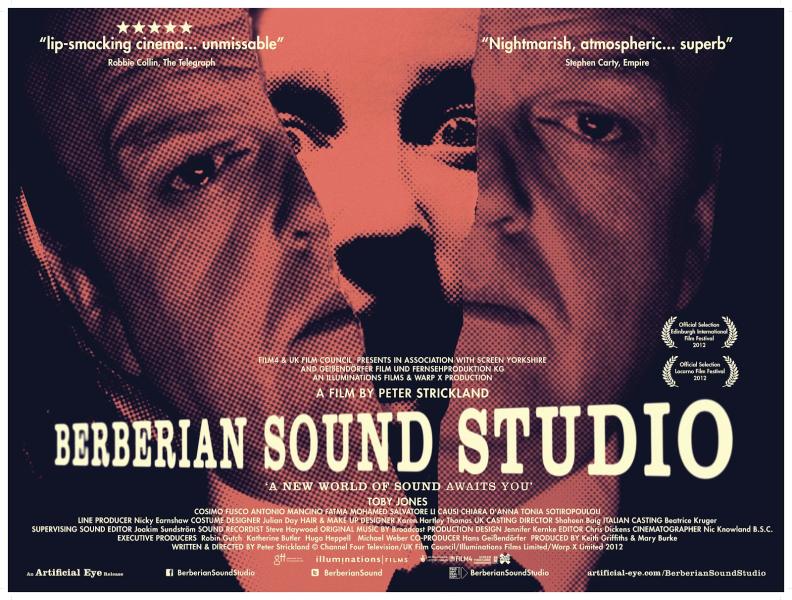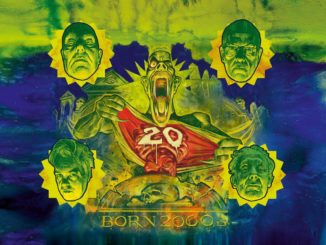Bookworm, Ghost Game, Shelby Oaks, The Hitcher, The Lonely Man With The Ghost Machine

Day two of Pigeon Shrine FrightFest! It’s a hot sweltering day in central London and everyone is in high spirits from last night’s triple whammy. Today looks set to continue in a similar vein: we have apocalyptic musings, hauntings and a restoration of a hit from the 80s. But First, we open on FrightFest’s first ever family film.

BOOKWORM
Directed by Ant Timpson
Ant Timpson and Elijah Wood previously worked together on Come To Daddy – a darkly funny story about a father and son trying and failing to connect. This time it’s a far gentler outing with Wood plays the dad, Strawn – a failed magician (aka “illusionist”). After a family mishap involving a toaster, he flies across from the States to bond with an eleven-year-old daughter he’s never met: Mildred. She’s a know-it-all kid (aka “brutal realist”) who uses books as an escape from another otherwise dull existence in school – which he hates, along with everyone in it. For reasons that become apparent later, she focuses on filming a local campfire legend, The Canterbury Panther. So, the two of them go on an ill-advised camping trip into the New Zealand countryside to “get the bugger” and find a common link with each other. It’s a sweet set-up that resembles family adventures from decades prior as she leads him through the same terrain that previously stood in for Middle-Earth – once again providing a picturesque backdrop.
Unlike Lord of the Rings there isn’t a lot of action to this film, or even much of a plot, meaning the heavy lifting comes from the characterisation. Thankfully, as a showcase for both leads, there’s a lot to like here. Nell Fisher plays Mildred like Lisa Simpson if she were an asshole while Elijah Wood is an endearing coward totally ill-equipped for whatever gets thrown at them. Thus, their arcs couldn’t be more different: he needs to step-up and be more stoic while she needs to drop her guard and let more people in. And though their dynamics are repetitive, with the focus on contrast meaning the same odd couple tensions arise over and over again, they play off each other so well you won’t get bored (even if you want her to be a bit nicer to him for the sake of variety). The gradual coming together is rewarding to watch and gives the film an emotional core. In particular an argument scene, at a point where things already seem like they can’t get worse, hits hard on both sides. As it goes on the nature of the threat changes, with Timpson and his cast striking a balance between dark comedy and danger, and it’s enjoyable to see how they adapt to their new situation – the moments they play as a team are contagiously fun and made all the more rewarding by the humorous bickering. A joyful start to Day 2.

THE LONELY MAN WITH THE GHOST MACHINE
Directed by Graham Skipper
FrightFest is all about contrast, and the jump to this flick could give someone tonal whiplash. It’s a low-budget post-apocalyptic art film where the last man in the world, Wozzek, paces alone in a cabin, losing his mind. Written/directed by and starring Graham Skipper, this is an intimate portrayal of an isolated man who has lost everything except his regrets and the ghosts of his past. It’s a sad existence mainly consisting of sad wanking, foraging for goods and singing to an audience of just himself. His only company is a recording of his own voice he dialogues with and the titular machine – essentially a bulb on a frame he uses to resurrect the memory of his tragically deceased wife Nellie. However, she only appears briefly before fading out with the light. Then the knocking starts: a creature known as The Deleterian who speaks with smooth, dulcet tones threatening him with even worse to come. Skipper is a gifted actor who can command our empathy – vital since he is by himself for most of the running time. He’s also able to put himself through the emotional wringer, spending many scenes in despair and suffering one of the most unpleasant bathroom trips ever shot. However, much of the dialogue is too direct and exposition-heavy. And though the scenes with Nellie are from his perspective, she feels of a symbol than a fully-fledged character in her own right, dampening some of the dramatic elements.
Similarly, we don’t get a feel for what The Deleterian is capable of – it’s another abstraction in a film of abstractions – leading to an absence of dramatic stakes. About halfway through, a character says “we’re almost at the end.” We weren’t, but the lack of forward momentum makes it tricky to see where we are in the actual story beats. Still, it picks up again, and the third act is the most interesting, going some way towards interrogating Wozzeck as a narrator. The closing scenes are the standout and a worthy reward for the uneven journey getting to them. Skipper also establishes himself as an excellent visual storyteller who can conjure up hypnotic images and imbue even pedestrian scenes with feeling and meaning. For example, the contrast between the colour of his memories with otherwise dull monochrome points to the potential for hope and redemption in the worst circumstances. Yet there’s no disguising that the creature feature aspects are hampered by its budgetary constraints. We get interesting lore, but with cheap-looking visuals and little physical danger, it feels toothless. Where something like The Invisible Raptor can turn this into part of the joke, here it’s a source of frustration and The Deleterian’s philosophical musings cannot compensate for its lack of physicality, occasionally derailing the story or grind it to a halt. I’d like to see Skipper’s vision realised on a bigger scale so, as with Wozzeck and Nellie, the sadness comes from what could have been.

GHOST GAME
Directed by Jill Gervargizian
Some viral challenges are stupid but ultimately harmless—remember when people ate cinnamon by the spoonful? Others are stupid and dangerous to all parties, like the one Vin finds out his belle Laura is participating in: sneaking into people’s houses, living there undetected and making them think the place is haunted. Being roughly as dumb as she is, and insecure she’ll think he’s a wet blanket if he doesn’t, he says he and wants in, and together, they combine their stupidities to target an infamous haunted house where a former homemaker of the year poisoned then drowned her husband and kids. Once inside spooky things start happening as they watch the new owners descend into madness. It’s a nice premise – a supernatural twist on Good Neighbour – and a believable way of taking the pointless things people do for clout to its limit. It’s also a welcome return to the genre for Gervargizian, who previously gave us the hairdresser turns stalker film The Stylist – something this is very stylistically different from.
I usually don’t like to be bad mouth actors, but the performances are mixed with one cast member in particular not selling the material at all (you’ll know when you see them). Kia Dorsey is the clear highlight, stealing the show as Laura. She leans into the character’s many flaws that’d make her a bad person to know, but also finds the vulnerability behind a bored, demotivated temp worker trying to feel alive and be a part of something bigger. Elsewhere, the few scares we get are well-crafted, with one in particular making me jump. I think it’d help if we got to know the house well, save for a room with a chandelier, or the mythos had been better developed. On that point, some moments that should be significant pass with little impact in what often feels like a sprint for the finale. The ending is hugely rushed, and the cut to the credits is almost comically abrupt. The story beats themselves are ok, even if a needless side quest detracts from the urgency, but it doesn’t feel like the situation gets fully exploited for its tension. Sometimes less is more, but since it takes its time to get going, I’d have liked to see another 15 minutes or so devoted to upping the horror and building suspense.

SHELBY OAKS
Directed by Chris Stuckmann
Speaking of stupid viral games, Paranormal Paranoids were a group of vlogger investigators who went missing in the abandoned town of Shelby Oaks. Three of them later showed up dead though one of them, Riley, was never found. 12 years later, Mia, her sister has done some investigating of her own and is the focus of a TV show about the disappearance. This part of the film is presented like a documentary ala Lake Mungo, and perfectly captures the sorts of victim-led true crime shows that show up on the telly all the time now. It allows exposition in an organic way, raises some questions that will be answered later and grounds the search in something concrete. It’s also an intriguing plot, if a little unambitious. However, narratively and tonally, things change when Mia receives a videotape through… Let’s just say the delivery is unorthodox. I’ll leave the plot description there – a video intro from Chris asked us to reveal very little. Not that it does anything completely radical, though. We don’t suddenly find out they’re living in a simulation or any other genre shift: it’s horror all the way. But hey, I’m always one to try and respect the wishes of a filmmaker.
Shelby Oaks marks the directorial debut of YouTube film critic-turned-filmmaker Chris Stuckmann. It’s dead impressive visually—if you weren’t told, you wouldn’t know it was funded by Kickstarter. Stuckmann is at home with the grainy handheld language of VHS, the charming DIY look of YouTube, and the sheen of modern cinema. Some of locations are also incredible – utterly immersive – and at its best, Shelby Oaks watches like Sinister meets Silent Hill with a dose of Ari Aster. It’s thick with atmosphere and will have you watching your windows at night. Unfortunately, much of it is also fairly pedestrian, including the central mystery – you won’t necessarily guess what sort of film you’re watching at the start, but the process to get there in Act 2 is often workmanlike. Still, the third distinct section achieves a level of intensity missing for large sections in the middle – partially because the threat gets more personalised, but also the movie’s voice is more pronounced. Importantly, as much as I was invested in Mia finding out what happened to her sister, that was more because I cared about Riley than I did her. She’s not a dislikeable character – just a bland one who lacks uniqueness or edge. Other aspects were similarly underdeveloped: big reveals lacked dramatic impact, and I wanted the husband, Robert, to do more than obstruct Mia and remind us they don’t have kids. But then it wouldn’t be a modern horror without family and trauma raising their heads. A solid film and a promising start of a new career.
I also saw:
The Hitcher. As with The exorcist last year and Elm Street before, FrightFest has a history of doing special 4k presentations of classics. In this case, it was Second Sight Films’ new restoration of The Hitcher. It’s widely considered a classic thriller, and it’s not hard to see why: the action sequences are brilliantly constructed displays of practical effects, the characters are memorable and director Robert Harmon constantly finds a way to up the tension.








Be the first to comment